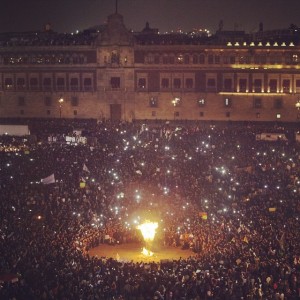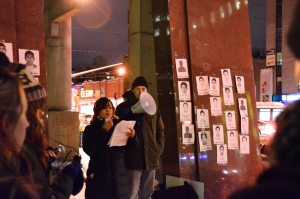Vigil held at the Human Rights monument in Ottawa, Canada. November 20, 2014. 6PM.
Thank you everyone for coming. I would like to start off by acknowledging that this gathering is taking place in unceded Algonquin territory. The fact that we are here today is an expression of state violence, which demonstrates that the phenomenon is well and alive around the world, even in Canada.
I would like to thank the Frente para la Defensa de los Pueblos Húgo Chávez (Ottawa), Memoria Viva (Edmonton) and SOS por Mexico (Montreal) for all the support in organizing this vigil. I would also like to acknowledge the presence of members of the community who are concerned, outraged and saddened by the situation in Mexico. Today we stand here not because there are 6 dead students, 25 wounded and 43 missing. But we stand here because one death, one wound or one disappearance should never be tolerated, accepted or condoned.
Today we commemorate 104 years since the Mexican Revolution, a revolution that started off in response to state violence, oppression and poverty. Tonight over 200 cities around the world stand in solidarity with Ayotzinapa and with the Mexican people. Mexican activists and the family members of the 43 missing students called for a national strike to raise awareness of the situation in Mexico. Thus, we stand in solidarity with the protesters, and we pray for their safety for they have reached Mexico City just to find the capital filled with police and army forces.
The Ayotzinapa case is one of many. Like other countries with colonial histories, the Mexican government has made use of state violence against Indigenous and marginalized communities, students, teachers, political activists, immigrants, children and youth. The situation in Mexico has been rarely called out by the international community except in instances where citizens of rich countries are affected, as if the lives of our own people were worthless.
In 1968 the Mexican government kidnapped, tortured, disappeared and killed hundreds of students. We commemorate this tragedy as the Massacre of Tlatelolco, which precluded the Olympic Games of that year. To date many of these students remain missing; yet, the Olympic Games were celebrated with little international resistance.
In 1994 the Zapatista movement rose to say “No more state violence” and “No more state complicity with the neoliberal project.” The Mexican government responded with paramilitary attacks and with unspeakable human rights abuses that included the murder of 45 unarmed women and children in Actéal, who were praying in the community’s church. But governments around the world remained silent.
In 2002 and 2006 police and army forces attacked the community of Atenco seeking to displace them from their land to build an airport. To date, multiple testimonies of rape and sexual violence have been recorded; however, no high level bureaucrat or politician has been made accountable.
The situation in Ayotzinapa is unfortunately very well known to Mexicans and many Latin Americans. On September 26th, the students of Ayotzinapa’s teaching college sought to reach Mexico City in an attempt to honour those missing in 1968. Little did they know that just few hours later they would be intercepted by the police and that, after seeing some of their peers die from gun shots, the would be handed over to an armed stream of the organized crime in their state.
After much public pressure and several instances of violence, the Mexican government has admitted that many government bureaucrats and elected officials act in complicity with the organized crime. The very same organizations that the War on Drugs and Plan Merida are said to be fighting, act on behalf of the state. To put it all in perspective. The military approach to violence formally adopted in 2006 has resulted in over 80,000 deaths, over 20,000 missing individuals and over 24,000 feminicides.
The effects of the War on Drugs have been deadly for the civilian population. In less than 10 years, Mexico has more deaths and missing peoples than the Vietnam War. We have more “casualties” that the official statistics show for the invasion of Iraq and Afghanistan. And the drugs continue to flow along with weapons and ammunition that are used against our people.
But despite this, Enrique Peña Nieto continues to be considered the President of Mexico internationally. Last week, in the midst of the Ayotzinapa case, Peña Nieto traveled to China, where he was received as the legitimate head of the state. How many deaths does it take for the international community to condemn the situation? How many missing people does it take for a president not to be welcomed in the international arena for its human rights violations?
Peña Nieto has accused the protesters of wanting to destabilize his government. But what kind of stability can a government have when it rests on the blood of its people?
Enough is enough.
Today we stand here in solidarity with the families and friends of the 43 missing students, but we also stand here to raise awareness of state violence. Mexico is not an isolated case. State violence has been repeatedly used across the continent. Let’s not forget the missing and murdered political dissidents of Argentina, Chile, Uruguay, Paraguay, Nicaragua and Honduras. Let’s not forget the missing the death squads of the Fujimori regime. Let’s not forget the genocide of Indigenous peoples in Guatemala and El Salvador. Let’s not forget the assimilation of Indigenous peoples in Canada, the U.S. and Mexico. Let’s not forget the numerous missing and murdered Indigenous women that governments across North America have failed to investigate. Let’s not forget the marginalization and discrimination of LGBTQIA communities. Let’s not forget the criminalization of peoples of colour and the Islamophobia that permeate today’s political discourses.
Let’s not forget about each other’s scars.
But there is hope.
As the Mexican proverb says, “The tried to burry us, but they did not know that we were seeds.” Today millions of people across the world are leading protests, demonstrations and vigils to resist state violence.
A recent solidarity message from the Zapatista leadership states,
“There will be a very deep change, a real transformation in this and other wounded soil of the world. There won’t be one, but several revolutions that will shake the planet. The result won’t be a change of the names and the labels, where those in power will still live at the expense of those at the bottom. The true transformation will not be a change in government, but the change of relationships. The people will lead and the government will obey.”
We are not here because we want to. We are here because we have to. There will be no change without our support.
We demand no more state violence.
No more missing and murdered.
No more feminicides.
No more children and youth left behind.
No more stolen lands.
No more criminalization.
No more racial profiling.
No more occupation.
No more corruption.
No more impunity.
We demand justice and we demand transformation.
Ayotzinapa, we stand in solidarity. We stand to raise awareness. You are not alone and you are not forgotten.
#TodosSomosAyotzinapa
The Ottawa Vigil honoured and remembered the 43 missing students
Abel García Hernández
Abelardo Vázquez Peniten
Adán Abrajan de la Cruz
Alexander Mora Venancio
Antonio Santana Maestro
Benjamín Ascencio Bautista
Bernardo Flores Alcaraz
Carlos Iván Ramírez Villarreal
Carlos Lorenzo Hernández Muñoz
César Manuel González Hernández
Christian Alfonso Rodríguez Telumbre
Christian Tomas Colon Garnica
Cutberto Ortiz Ramos
Dorian González Parral
Emiliano Alen Gaspar de la Cruz.
Everardo Rodríguez Bello
Felipe Arnulfo Rosas
Giovanni Galindes Guerrero
Israel Caballero Sánchez
Israel Jacinto Lugardo
Jesús Jovany Rodríguez Tlatempa
Jonas Trujillo González
Jorge Álvarez Nava
Jorge Aníbal Cruz Mendoza
Jorge Antonio Tizapa Legideño
Jorge Luis González Parral
José Ángel Campos Cantor
José Ángel Navarrete González
José Eduardo Bartolo Tlatempa
José Luis Luna Torres
Jhosivani Guerrero de la Cruz
Julio César López Patolzin
Leonel Castro Abarca
Luis Ángel Abarca Carrillo
Luis Ángel Francisco Arzola
Magdaleno Rubén Lauro Villegas
Marcial Pablo Baranda
Marco Antonio Gómez Molina
Martín Getsemany Sánchez García
Mauricio Ortega Valerio
Miguel Ángel Hernández Martínez
Miguel Ángel Mendoza Zacarías
Saúl Bruno García

